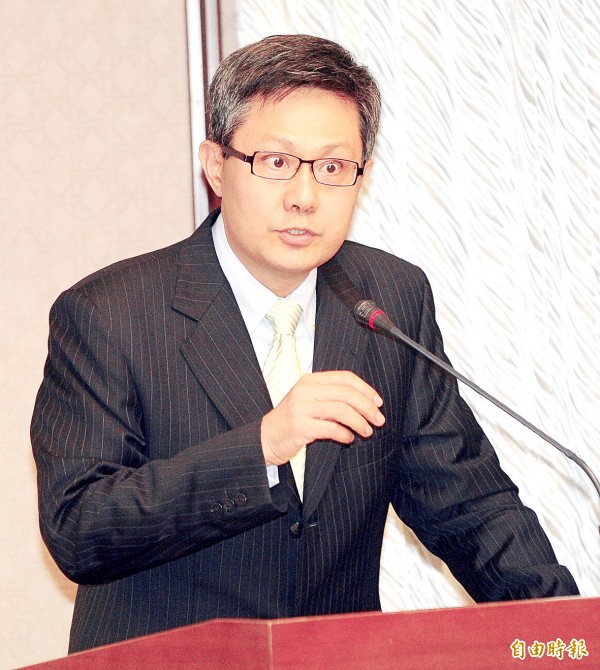《TAIPEI TIMES》 ‘Peace accord’ bad for nation: expert

National Taiwan University law professor Chiang Huang-chih speaks at an event on April 7, 2014. Photo: Chen Chih-chu, Taipei Times
By Chung Li-hua and Jake Chung / Staff reporter, with staff writer
Signing a “peace accord” with Beijing could lead to Taiwan being considered part of “China’s internal affairs” and complicate foreign intervention, National Taiwan University College of Law professor Chiang Huang-chih (姜皇池) said yesterday.
The idea of signing a cross-strait peace accord has waxed and waned since the creation of the so-called “1992 consensus” and was most avidly discussed after former president Ma Ying-jeou (馬英九) took office in 2008, Chiang said.
The “1992 consensus” — a term former Mainland Affairs Council chairman Su Chi (蘇起) in 2006 admitted making up in 2000 — refers to a tacit understanding between the Chinese Nationalist Party (KMT) and the Chinese Communist Party (CCP) that both sides of the Taiwan Strait acknowledge there is “one China,” with each side having its own interpretation of what “China” means.
Ma spoke about signing a peace accord in his 2008 inaugural speech and it was in 2016 also adopted by then-KMT chairwoman Hung Hsiu-chu (洪秀柱) in the party’s policy guidelines.
The idea was broached again following a Jan. 2 speech by Chinese President Xi Jinping (習近平) in remarks on Jan. 5 by 21st Century Foundation chairman Kao Yu-jen (高育仁), who said that both sides of the Taiwan Strait should establish a similar historical view, initiate political dialogue and sign an armistice.
Kao is the father-in-law of former New Taipei City mayor Eric Chu (朱立倫), who has declared his intention to run for president next year.
Documents handling peace between nations include peace treaties, ceasefire agreements and armistices, which are considered legally binding in terms of international law, as well as peace accords, Chiang said yesterday.
The precondition to a peace accord is the conclusion of a war, which implies the cessation of hostilities between an internationally recognized government and rebels, or between multiple political entities within a nation, he said.
“As there is neither a state of war nor an armed conflict between Taiwan and China, there is no war to be halted,” meaning the need to sign a cross-strait peace accord is questionable, Chiang said.
Saying that a peace accord should be signed would be an acknowledgement that current or future cross-strait conflicts are a continuation of the Chinese Civil War between the KMT and the CCP, making cross-strait relations “China’s internal affairs” and increasing the difficulty of international intervention, he said.
Cross-strait relations being identified as “China’s internal affairs” would deprive US arms sales to Taiwan of international legitimacy, he added.
Taiwan should carefully consider what message it would be sending to the international community if it agrees to an armistice with China, Chiang said, adding that the nation could lose much if pressured into negotiating under the threat of conflict.
新聞來源:TAIPEI TIMES
%http://www.taipeitimes.com/
















